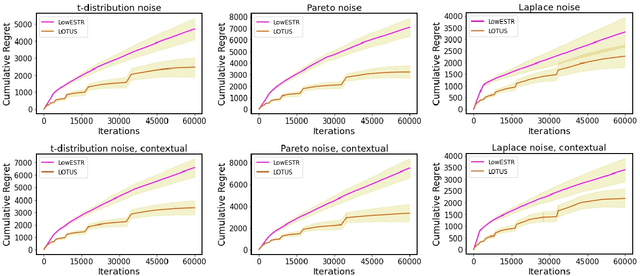Low-rank Matrix Bandits with Heavy-tailed Rewards
Paper and Code
Apr 26, 2024
In stochastic low-rank matrix bandit, the expected reward of an arm is equal to the inner product between its feature matrix and some unknown $d_1$ by $d_2$ low-rank parameter matrix $\Theta^*$ with rank $r \ll d_1\wedge d_2$. While all prior studies assume the payoffs are mixed with sub-Gaussian noises, in this work we loosen this strict assumption and consider the new problem of \underline{low}-rank matrix bandit with \underline{h}eavy-\underline{t}ailed \underline{r}ewards (LowHTR), where the rewards only have finite $(1+\delta)$ moment for some $\delta \in (0,1]$. By utilizing the truncation on observed payoffs and the dynamic exploration, we propose a novel algorithm called LOTUS attaining the regret bound of order $\tilde O(d^\frac{3}{2}r^\frac{1}{2}T^\frac{1}{1+\delta}/\tilde{D}_{rr})$ without knowing $T$, which matches the state-of-the-art regret bound under sub-Gaussian noises~\citep{lu2021low,kang2022efficient} with $\delta = 1$. Moreover, we establish a lower bound of the order $\Omega(d^\frac{\delta}{1+\delta} r^\frac{\delta}{1+\delta} T^\frac{1}{1+\delta}) = \Omega(T^\frac{1}{1+\delta})$ for LowHTR, which indicates our LOTUS is nearly optimal in the order of $T$. In addition, we improve LOTUS so that it does not require knowledge of the rank $r$ with $\tilde O(dr^\frac{3}{2}T^\frac{1+\delta}{1+2\delta})$ regret bound, and it is efficient under the high-dimensional scenario. We also conduct simulations to demonstrate the practical superiority of our algorithm.
 Add to Chrome
Add to Chrome Add to Firefox
Add to Firefox Add to Edge
Add to Edge